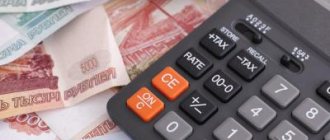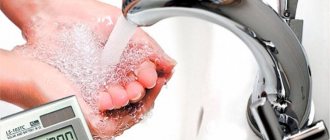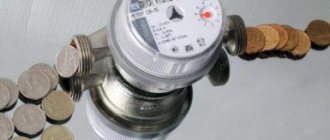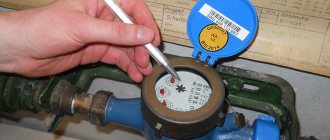What services are covered?
From 2021, an increasing tariff for utilities will be applied when billing for cold and hot water supply. A similar procedure also applies when paying electricity bills. The increased rate for payment for cold water is applied only if meters in apartments are not installed at the initiative of the owners. That is, when citizens have the technical ability to install them. If this is not possible, the increased payment coefficient will not be applied. However, in this case, Russians need to provide the utility services with a corresponding certificate confirming the fact that it is technically impossible to install the meter.
The essence of the innovations lies in the following points:
- If a heat meter has not been installed in an apartment building, apartment owners do not pay for utilities at an increased rate.
- If the management company did not take care of installing meters in residential buildings, it undertakes to pay 10% more than the amounts that are established for residents for utilities.
Increased payments for water supply do not apply to communal apartments, where it is not possible to install individual meters for each family. Also, the increased rate is excluded if there is a drainage system in the premises. The increased tariff for cold water can only be applied to owners of apartments and private houses.
When housing is in social rent, the tenant undertakes to contact the local government department to install metering meters. If technically possible, the authorities must provide the applying citizen with special equipment for recording data. When living in a private house, payment for utilities at increased rates occurs only if the building is recognized as a residential premises.
Fee calculation
When the payment for a water resource is calculated in a room where there is no individual management system, the standard for each registered person is applied. The resulting amount is multiplied by the applicable increase rate.
Meaning
Obviously, a family of 2 people in the apartment where water meters are installed saves more than 200 rubles per month on cold water charges. Therefore, installing meters pays off quite quickly!
Order dated December 17, 2020 No. 352-TR “On the adjustment for 2021-2023 of the established long-term tariffs for thermal energy (capacity) and for thermal energy transmission services for the public joint stock company “Moscow United Energy Company”.
LLC Management Company "Sviblov GRAD" is an organization that manages apartment buildings located in the Sviblovo and Yuzhnoye Medvedkovo areas and provides housing and communal services to citizens at prices and tariffs approved by regulations of the city of Moscow. From January 1, 2021, in settlements with the population, we are guided by the orders of the Department of Economic Policy and Development of Moscow:
Order dated December 17, 2020 No. 358-TR “On the adjustment for 2021-2023 of the established long-term tariffs for drinking water (drinking water supply), process water and sanitation for the Mosvodokanal joint-stock company.”
From January 1, when filing a claim in court, they are required to indicate the personal data of the debtor, for example, passport data, tax identification number or driver's license number. At the same time, they will be able to request this information through the court from the authorities without the right to transfer this data anywhere. It is this procedure that will make it possible to obtain the necessary information and protect the personal information of citizens. In simple words, you don’t need to go and give such information to the management company yourself. The authorities, upon their request, will provide this information themselves without the right to transfer it to third parties.
From January 1, it will become easier to apply for a subsidy. Russians will no longer need to provide documents to social security authorities indicating that they have no rent arrears. Institution specialists will begin to request this information independently through the GIS housing and communal services information system or interdepartmental interaction channels. Let us remind you that in our country large families, disabled people, pensioners and low-income people have the right to a subsidy. If there is a debt, subsidies may be refused. But pensioners have the opportunity to receive a subsidy even if they have debt; if the company that provides you with utility services enters into an agreement on debt restructuring, then a subsidy can still be assigned if there is such an agreement.
You may like => Can a full-time student receive compensation for caring for an 80-year-old pensioner?
From January 1, the moratorium on sanctions for debt, which was in effect from April 6 to December 31 of this year, is canceled. Defaulters will again begin to be charged penalties and fines, as well as turn off utilities. It is important that utility services do not go beyond the law: penalties cannot be accrued “retroactively” for the period from April 6 to December 31, 2021; from January 1, penalties can be charged only for debts incurred before April 6, 2020; For debts that arose during the moratorium period, penalties should be accrued only from the 31st day of delay.
The procedure for establishing the presence or absence of technical capabilities is determined and formalized in accordance with the order of the Ministry of Regional Development of Russia dated December 29, 2011 No. 627. This requirement is also enshrined in paragraph 81 of the Rules for the provision of public services.
Those who did not change the meter on time will also have to apply the indicated increased rates. According to the law, for example, it is recommended to change cold water meters after 6 years, and hot water meters after 4 years. The device can last longer (plus/minus several years), but the maximum service life does not exceed 12 years.
The use of the coefficient is excluded for premises with low electricity and heating consumption, as well as for dilapidated and dilapidated buildings subject to demolition. If the payment for resources has nevertheless been increased, you should contact the management company or the office of the resource supplier for clarification. If the owner for some reason does not transmit the meter readings to the employees of the management company or service provider, after receiving a receipt taking into account the increased coefficient, he has the right to ask for its recalculation. This can only be done by transmitting actual testimony. It is quite rare for a meter to be repaired or checked for more than three months. As a rule, the device is installed in place no later than the first month after dismantling. At the same time, payment for the resource is calculated based on the average value obtained taking into account the meter indicators for the previous six months.
In the receipts received monthly by residents, there is such a column - sewerage. Standards for it are set separately by each region and on average range from 130 to 360 liters per day. They are calculated depending on the region of residence and the degree of improvement of housing.
If the apartment does not have a meter installed, the calculation takes place according to sewerage standards multiplied by the approved tariff. The latter may change periodically, so the total amount on the receipt may also change. This usually happens once a year during the summer months.
Cases of application of the standard
In Russia, the function of regulating tariffs for utility services is assumed by the state, and rates for specific cases are under the jurisdiction of regional authorities. And this year our government decided to make a gift to our citizens and increase tariffs in two stages. At the first stage, from January 1, 2021, it will be increased by 1.7%, and at the second stage, from July 1, 2021, by 2.1%:
May 14, 2021 vektorurist 87
Share this post
- Related Posts
- Kaluga poor compensation
- Could land surveying be carried out in 2021?
- Changes to Article 228 of the Criminal Code
- Can bailiffs seize a car if it is registered to his wife?
In what cases is it used?
The increased rate on the bill for cold water is applied only if citizens do not have individual pension funds, but technically it is possible to install them in residential premises. If this is not possible, then residents pay utility bills at standard rates. You can learn about the criteria that qualify as technical impossibility of installing an IPU on Ministry Order No. 627 dated December 29, 2011.
The fact that it is not possible to install a meter must be confirmed at the regulatory level. To do this, an inspection report is drawn up for each living space. If there is no documentary evidence, then residents may be charged for utility services at an increased rate.
An increased tariff may be applied even if there is a meter on the premises. This happens in several cases:
- The device has failed.
- The readings were not taken from the meter within the prescribed period.
- Denial of registration access for a representative of the management company to check indicators.
If, during an inspection of the equipment, it was established that there was third-party interference in the work of the employee, the owner of the apartment undertakes to pay for utilities at an increased rate (coefficient 10).
When to expect an increase in tariffs for housing and communal services in 2021
From the beginning of the year, utility bills may be reduced for large families, disabled people, some categories of pensioners and low-income people. They will receive the benefit only if there is no debt, writes Life. In addition, those who receive subsidies will no longer need to provide documents proving there are no late payments; social security authorities will check the information themselves.
Checking metering devices
However, with the onset of 2021, restrictions will be lifted and, according to the authorities, growth is planned for most housing and communal services. The authorities will help with subsidies to pay for utilities according to the new rules. We will tell you more about all the innovations in this material from the Interesting Russia publication.
Federal Law No. 468-FZ of December 29, 2021 “On Amendments to the Town Planning Code of the Russian Federation and Certain Legislative Acts of the Russian Federation” transfers the obligation to indicate the identifiers of the debtor citizen when drawing up statements of claim and applications for a court order until 2022 (Article . 4).
You might be interested ==> Work experience for a labor veteran for men in Chuvashia
When may not be applicable
When installing metering meters and timely provision of data on the use of cold water supply, citizens are not charged an increased coefficient for paying for utility services. In this case, invoices will be issued after collecting data from devices installed in residential premises. The increased coefficient does not apply in the following cases:
- When using hot water to heat a living space.
- In cases where citizens live in apartments in which it is not possible to install individual metering devices.
- The room is equipped with a drainage system.
The increasing coefficient does not apply if citizens live in unsafe houses. Another clear case of the absence of an increased rate is the minimum consumption of electricity (no more than 5 kW) and heating (no more than 0.2 Gcal/h) in a residential area. In this case, Russians cannot install metering meters even if they have the technical capabilities. Consequently, the increasing coefficient will not be applied to citizens’ accounts.
Application of the Increasing Coefficient in the Absence of Metering Devices 2021
The local government structure must announce a decision on the suitability of the property for permanent residence. And living conditions must be in accordance with technical and sanitary requirements.
Counters, fines and compensation. From January 1, the payment procedure for housing and communal services will change
The legislator allows the maintenance of utility tariffs for 3 months. The time limit is allotted to eliminate the breakdown of the metering device. After the expiration of the specified period, an increasing factor will be applied in the calculation, regardless of the circumstances of the case.
You might be interested ==> If you don’t pay for electricity, for what period do you go to court?
As already mentioned, the cost of one cubic meter of water is determined by regional authorities. However, standards for water consumption and disposal of used water were established back in 1988. These utility standards are still in effect today.
Currently, the management company charges apartments without water meters a tariff with an increasing coefficient. The transition to direct payments between the population and the water utility is planned. Who will receive this bonus in the future? Management company or water utility?
Letter of the Ministry of Construction and Housing and Communal Services of the Russian Federation dated June 2, 2021 No. 19506-00/04 On the application of increasing coefficients when paying the cost of thermal energy July 26, 2017 The Department of Housing and Communal Services of the Ministry of Construction and Housing and Communal Services reviewed the letter on the issue of applying increasing factors coefficients and, within the framework of its competence, reports the following. According to Part 1 of Article 157 of the Housing Code of the Russian Federation, the amount of payment for utilities is calculated based on the volume of consumed utilities, determined by the readings of metering devices, and in their absence, based on the standards for the consumption of utilities (including including standards for the accumulation of solid municipal waste) approved by government bodies of the constituent entities of the Russian Federation in the manner established by the Government of the Russian Federation. When calculating payments for utility services for owners of premises in apartment buildings, who have an obligation established by the legislation of the Russian Federation to equip their premises with metering devices for used water, electrical energy and whose premises are not equipped with such metering devices, increasing coefficients are applied to the consumption standard of the corresponding: type of utility service in the amount and in the manner established by the Government of the Russian Federation. Rules for the provision, suspension and limitation of the provision of utility services to owners and users of premises in apartment buildings and residential buildings, approved by Decree of the Government of the Russian Federation of May 6, 2011 No. 354 (hereinafter referred to as Rules No. 354). In cases established by the Rules, mandatory when concluding a management agreement organization or partnership of homeowners or a housing cooperative or other specialized consumer cooperative of contracts with resource supply organizations approved by Decree of the Government of the Russian Federation dated February 14, 2012 No. 124 (hereinafter referred to as Rules No. 124), taking into account changes made by Decree of the Government of the Russian Federation dated December 26, 2016 No. 1498, the cost of a utility resource supplied by a resource supplying organization to an apartment building is determined using an increasing coefficient. Clauses 42, 43, 60, 60(1), 62, 81(11), 85(3) of Rules No. 354 provide for cases of applying an increasing coefficient to the amount of payment for the corresponding utilities. The increasing coefficient does not increase the volume of utilities sold. The use of an increasing coefficient when calculating the volume of utility services is a measure aimed at stimulating consumers of utility services to install, timely repair and replace metering devices used in payments for utility services (Part 2 of Article 13 of the Federal Law). Thus, if the provider of utility services is a resource supplying organization, then the funds from the sale of utility resources, taking into account the application of increasing coefficients, form the income of the resource supplying organizations, used by the latter to meet expenses for regulated activities. Income received from the use of increasing factors is not taken into account when adjusting tariffs approved for the next year. Such income of the resource supplying organization cannot be envisaged for a long-term period of regulation. GARANT.RU: https://www.garant.ru/products/ipo/prime/doc/71627426/#ixzz59W90p8Cc
The Ministry of Construction of the Russian Federation conducted a study that gave more accurate indicators of resource costs. The basis was taken as a living space, where there are all types of plumbing and amenities. Over the course of a month, the residents of this house spent resources on:
Not taking into account the fact that there is a difference in user standards, depending on the region, there is a certified average resource consumption rate for the country. According to it, a citizen who does not have a water meter installed spends 6.96 cubic meters of cold water supply, and 4.8 m3 falls on hot water.
Water supply is one of the key public services available to citizens. As of today, payment for a resource can be calculated in two ways. The first is based on the indicators of the water meter, if there is one. And the second is payment based on the average statistical indicators of consumed consumption per person. When choosing one of them for yourself, you must know the water consumption standard for 1 person without a meter.
A significant difference for drawing up acts that determine the availability of the technical ability to install a common house metering device from acts relating to individual metering devices is the mandatory participation of the resource supplying organization.
Increasing factor
The current legislation has some features of using an increased coefficient depending on the type of utility service.
For heating
When installing metering meters in residential premises, citizens have the opportunity to pay user bills based on the consumption of thermal energy. In this case, the tariff does not increase. Due to the fact that suppliers independently manage material resources received from residents, the payment coefficient was reduced from 1.5 to 1.1. It applies not only to homeowners, but also to legal entities using real estate to provide social services.
On the water
If the owners of residential premises have not installed metering meters, water supply bills will be sent to them at an increased rate. In this case, general house water consumption is paid taking into account regulatory requirements. Increased utility rates apply to hot and cold water supply.
To calculate the amount for cold water supply, the calculation is carried out as follows: the number of citizens registered in a residential building is multiplied by the cold water consumption standard, increasing the coefficient by 1.5, and by the tariff that was approved by the local government. The calculation of the payment amount for hot water supply depends on the method of tariffication of hot water consumption. When calculated in cubic meters, the calculation of the amount to pay for utilities follows the same principle as with cold water.
If we are talking about a two-component tariff, then in this case the payment for cold and hot water is taken into account separately. For calculations, indicators such as the volume of water according to the consumption rate and the volume of heat to stabilize the water temperature are taken. Increasing indicators are added to the received data.
For electricity
Special metering devices are needed for calculating utility bills and electricity. This obligation has been introduced for citizens at the legislative level. At the same time, meters with accuracy class 2.0 and higher are used in residential premises. The cost of the device and its installation are included in the tariff. Therefore, residents do not pay additional funds for this operation. If Russians use electricity without metering devices, then they pay for utilities at an increased coefficient of 1.5.
For private houses
In order to oblige citizens living in private houses to pay an increased rate, it is necessary to recognize the premises as residential. This means that local authorities must provide a document stating that people can live in a particular house. Normally, all private buildings should be equipped with metering meters so that citizens can avoid unnecessary costs.
Standards determining price in the absence of IPU
Not taking into account the fact that there is a difference in user standards, depending on the region, there is a certified average resource consumption rate for the country. According to it, a citizen who does not have a water meter installed spends 6.96 cubic meters of cold water supply, and 4.8 m3 falls on hot water.
There is no generally accepted legislative document determining how much of a resource the population can spend. All citizens are given the right to independently determine the amount of expenses. However, according to SNiP 2.04.01-85, a document describing the indicative basis for calculations, these data are not mandatory. Thanks to the study, legislators determined the average spending rate. On average, each person is able to spend 200 liters of resource for taking a bath weekly. Also, about 30 liters are consumed when taking a shower. We spend about 180 liters per week on toilet flushing. And approximately 200-250 liters are the costs necessary to satisfy other hygiene needs (cleaning, washing, etc.).
According to subparagraph “e” of paragraph 22 of Rules No. 124, if there is an obligation and technical ability to install a collective (common house heat energy metering device), the cost of thermal energy supplied to an apartment building not equipped with such a metering device, as well as supplied to an apartment building after 3 months after failure, loss of a previously put into operation collective (community) heat energy meter (after the expiration of its service life), as well as (the cost of supplied thermal energy if the contractor fails to provide information on the readings of the collective (common house) heat energy meter within the deadline , established by law or a resource supply agreement, if the contractor does not allow representatives of the resource supply organization 2 or more times to check the condition of an installed and put into operation collective (common house) heat energy metering device (checking the accuracy of the information provided about the readings of such a metering device) are determined based on the utility consumption standard heating services and the total area of residential and non-residential premises in an apartment building using an increasing factor, the value of which is set at 1.1. This coefficient is not applied if there is an inspection report to establish the presence (absence) of the technical feasibility of installing a collective (common house) utility metering device, confirming the lack of technical feasibility of installing such a metering device, starting from the billing period in which such an act was drawn up.
You might be interested ==> Regional maternity capital in Kemerovo for 3 children amount official website
In addition, the PC will be used in situations where unauthorized interference in the operation of the electric meter is detected. The volume of utilities here is calculated depending on the number of people living in the apartment on a permanent or temporary basis. However, the management company does not always have accurate information about the number of residents. In this case, calculations are made taking into account the number of owners of the premises. When using this technique, the calculated payment will increase noticeably, which will force violators to fix problems.
The size of the increasing coefficient and calculation of payment
The increasing coefficient began to be applied in 2015. and was originally 1.1. Because since 2009 and to this day, not all apartment owners have bothered to install PU, the government issued a new law establishing from January 2019. new increasing factor equal to 1.6.
- lack of technical ability to install metering devices, confirmed by the Inspection Report;
- in houses classified as dilapidated or in disrepair, subject to demolition or major repairs;
- in houses, the power consumption of electrical energy of which is less than five kilowatts (in relation to the organization of metering of electrical energy used) or the maximum volume of consumption of thermal energy of which is less than two tenths of a gigacalorie per hour (in relation to the organization of metering of used thermal energy) (information on power consumption of electrical energy and the maximum volume of thermal energy consumption can be found in the management company, HOA).
- in the absence of individual or general apartment metering devices for hot water, electrical energy and if there is an obligation and technical ability to install such a metering device;
- in case of failure, loss or expiration of the metering device, if restoration (acceptance for commercial operation) of the device is not completed within 3 months.
- if the consumer fails to provide the contractor with access to the residential premises occupied by the consumer on the date and time specified in the notice of checking the condition of installed and put into operation individual, common (apartment) metering devices, checking the accuracy of the information provided about the readings of such metering devices - after 3 months from the date of drawing up the first act of refusal of access to the meter.
In what cases is an increasing coefficient applied to owners of apartment buildings?
Increasing coefficients are not calculated. Increasing coefficients were approved and put into effect by the Government of the Russian Federation (Resolution of the Government of the Russian Federation dated June 29, 2016 N 603 “On amendments to certain acts of the Government of the Russian Federation on the provision of utility services”)
- it is impossible to install an IPU on water without carrying out reconstruction and major repairs of an apartment building, engineering and communication systems;
- it is not possible to comply with the standards and requirements when installing meters;
- there is no way to ensure proper operation of metering devices.
The identified reason for the lack of technical capability must be stated in the act. One copy of the document must remain in the hands of the owner of the premises, one in the management company or HOA, and one in the resource supply company.
Cost comparison
Obviously, a family of 2 people in the apartment where water meters are installed saves more than 200 rubles per month on cold water charges. Therefore, installing meters pays off quite quickly!
Now Article 157 of the Housing Code implies that residents pay for water based on data from metering devices, while apartment owners who do not have water meters are forced to pay according to consumption standards with increasing coefficients. The total amount of payment for resources increases by an average of 50 percent (from 2017 to the present, the size of the coefficients when calculating payments for cold and hot water is 1.5).
Deputies of A Just Russia, led by Sergei Mironov, introduced a bill to the State Duma that would abolish the norm on increased water charges for those who have not installed meters in their apartments. The document is at the disposal of the Parliamentary Gazette.
Deputies propose to exclude this provision from Article 157. In addition, their initiative also affects public meters - so that they can not be installed in old houses where there is no technical possibility for this, the deputies propose to oblige management companies to independently prove this fact. Now residents need to collect evidence themselves.
The highest prices are traditionally in Moscow. Muscovites pay for electricity from 5 rubles. 66 kopecks per kW/h. For cold water 42 rubles. 30 kopecks per cubic meter (according to meters, not counting drainage), for hot food - 205.15 rubles. By the way, if more than 10% of the budget is spent on rent each month, then residents of the capital have the right to a subsidy.
Calculation example and formula
The formula for determining the amount of payments for cold water supply looks like this:
P = KolP * N * KP * T
P is the monthly amount for using the utilities.
KolP - the number of persons registered in the premises.
N is the water resource consumption rate established by the state.
KP - increasing rate.
T is the current tariff.
For example , 3 citizens are registered in an apartment. The water consumption rate is 5 cubic meters/person. The tariff for paying utilities is 25 rubles. The increasing factor is 1.5. To calculate the amount, you need to multiply all indicators - 3 * 5 * 1.5 * 25 = 562.5 rubles. In total, owners of residential premises need to pay 562.5 rubles for a month of using water supply.
Application procedure
- Calculation in cubes. In this case, the calculations for DHW and cold water are similar. Only the standard for hot water is 4.7 per person.
- Two-component tariff - thermal energy + cold water. That is, water consumption standards are taken and multiplied by the amount of heat that was required to warm it up. And then – to the increasing component (1.5).
You may be interested in:: Grandma turned 100 years old, will she be paid a million
For electricity
Their rates increase annually, usually in January and July. The rate of their growth is frightening. Therefore, the government has tightened control over exceeding the maximum cost of utility services at the regional level.
Recently, citizens have been forced to install meters in their apartments and houses. If the homeowner does not use them, then he must pay based on standards to which special coefficients are applied that increase the cost of water resources. Thus, paying for cold or hot water without a meter becomes financially burdensome.
How can you avoid being charged with a multiplier?
In order not to pay the increased rate, citizens need to prove that the absence of the device was the result of a lack of technical ability to install it. This information can be confirmed by documents. That is, the owners of residential buildings must receive an inspection report of the premises from authorized structures. The presence of this document guarantees that there will be no increase in the tariff rate on utility bills.
The act must indicate the reason for the inability to install meters. The document is published in three copies: one remains with the owner, the second is sent to the HOA, and the third to the company supplying the resources.
Water tariff without meter 2021 per person: how to calculate?
A receipt with this amount will be sent to the owner of the residential premises in the new month, if he does not have an individual meter installed. It is easy to understand that this is more than the IPU fee, even taking into account the costs of installing and purchasing a water meter. The costs will quickly pay off.
How much do they pay for water without a meter for 1 person?
- Г – number of citizens registered at the address;
- N – current standard for resource consumption;
- K – increasing coefficient (for 2021 it is equal to 1.5);
- T – water tariff, which is approved by local authorities.
Important! Decree of the Moscow Government of 2014 No. 75-PP indicates that the total volume of water use in housing not equipped with metering devices cannot be more than the approved standards per person, multiplied by 2.
Counters, fines and compensation. From January 1, the payment procedure for housing and communal services will change
Their rates increase annually, usually in January and July. The rate of their growth is frightening. Therefore, the government has tightened control over exceeding the maximum cost of utility services at the regional level.
Water tariff without meter in 2021
Current water tariffs and standards vary for each subject of the Russian Federation. They are established by local authorities based on regional characteristics, population density and other reasons.
Tariffs for this type of service may increase by more than 4.2%, since they are not tied to the level of inflation and the indexation procedure. In general, it is planned to increase the cost of housing and communal services by several percent over the coming years.
You may be interested in:: How to get on the waiting list for housing for young families in Gelendzhik
From April 6 to December 31, a moratorium on meter verification was established. It will be canceled from January 1st. For the first three months, that is, until April 2021, fees will be calculated based on the average meter readings for the last six months. Then, if the residents still do not verify, the receipts will begin to show the amounts accrued according to the standard. Moreover, taking into account the increasing factor of 1.5.
How is the rate of cold water consumption calculated: features
- filling the bath - 200 liters of water per week;
- shower use – 30 liters per day;
- water used in the toilet cistern is about 200 liters per week;
- washing dishes, washing – 200 liters per week.
- if devices for recording the consumption of cold water, hot water, heating, electricity are not installed;
- if 3 months have passed since the device broke down, it has not been repaired or replaced;
- or if the owner does not confirm the accuracy of the information and does not allow a housing and communal services specialist to inspect it.







